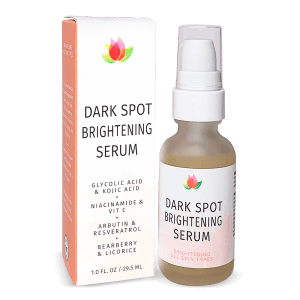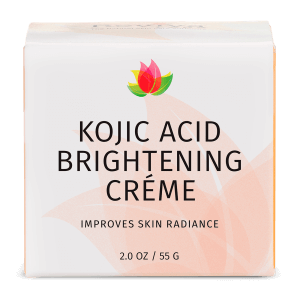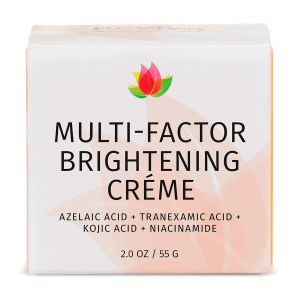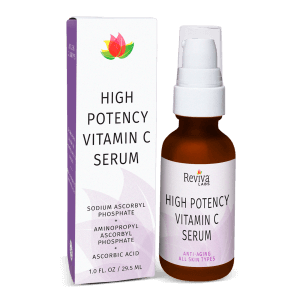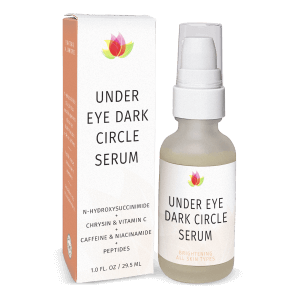Ingredients, Natural, Reviva Labs, Skin Care
The Power of Natural Brightening Ingredients
The desire for radiant, even-toned skin is universal and there is no shortage of products promising to achieve that glow. Recently, products using ingredients derived from plants, fruits and other natural sources have gained attention for their unique ability to brighten skin. Many of these natural alternatives can provide a gentler approach to brightening compared to synthetic counterparts and, with fewer side effects. Here’s a list of some of the most effective natural ingredients and the skincare products that use them.
Vitamin C – A Potent Skin Brightener
Vitamin C, also known as ascorbic acid, is one of the most popular natural brightening ingredients. Its ability to reduce the appearance of dark spots and hyperpigmentation stems from its antioxidant properties. Vitamin C works by inhibiting melanin production, the pigment responsible for skin color, which can lead to more even skin tone over time. In addition to brightening, Vitamin C also protects the skin from free radicals, which are harmful molecules that can accelerate aging.
Products like serums, moisturizers, and masks often include Vitamin C due to its versatility and effectiveness. For those with sensitive skin, derivatives like sodium ascorbyl phosphate can provide similar benefits with less irritation.
Niacinamide – The Multitasking Brightener
Niacinamide, a form of Vitamin B3, is another powerhouse natural brightening ingredient. It stands out not only for its brightening effects but also for its ability to address a variety of skin concerns, including acne, inflammation, and enlarged pores. Niacinamide brightens the skin by inhibiting the transfer of melanin to skin cells, which helps reduce dark spots and uneven skin tone.
Niacinamide can be found in serums, creams, and even sunscreens, making it one of the most accessible brightening ingredients available for daily use. Niacinamide is particularly effective for those with oily or acne-prone skin because it helps regulate oil production while brightening the complexion. Additionally, it is very gentle and can be used by most skin types, making it a go-to for many seeking a natural solution to dull skin.
Licorice Root Extract – Nature’s Gentle Brightener
Licorice root extract has been used for centuries in traditional medicine, and it has gained popularity in modern skincare for its ability to brighten and soothe the skin. On of the active components in licorice root, glabridin, inhibits the enzyme tyrosinase, which plays a key role in melanin production. This makes licorice root extract an effective natural option for reducing dark spots and hyperpigmentation that can be found in serums, cleansers, and spot treatments.
Another active compound in Licorice root, glycyrrhizin, provides anti-inflammatory, antioxidant and antimicrobial properties making it suitable for sensitive skin. Its gentle nature makes it an excellent choice for people looking to brighten their skin without the risk of irritation. While licorice root extract may not provide instant results, consistent use can lead to noticeable improvements in skin tone over time.
Kojic Acid – Derived from Fermentation
Kojic acid is derived from several different types of fungi. It’s also a by-product in the fermentation process of products that use rice including sale, soy sauce and rice wine. Known as an alpha hydroxy acid, it works by inhibiting the enzyme tyrosinase, which leads to reduced melanin production and provide a lightening effect on skin tone.

Kojic acid is commonly found in cleansers, creams, serums, and powders. Kojic acid is particularly effective in treating sunspots, melasma, and other forms of hyperpigmentation. However, it’s important to note that kojic acid can be irritating to some skin types, especially in higher concentrations. It’s often recommended to start with a lower concentration and gradually increase usage as the skin builds tolerance.
Alpha Arbutin – A Safe and Effective Alternative
Alpha arbutin, derived from the bearberry plant, is another natural brightening ingredient that has gained popularity for its effectiveness and safety. It works by slowly releasing hydroquinone, a well-known skin-lightening agent, in a controlled manner. This slow release reduces the risk of irritation and makes alpha arbutin a safer alternative to synthetic hydroquinone.
Alpha arbutin is frequently found in serums and creams and is suitable for all skin types, including sensitive skin. Its ability to fade dark spots and even out skin tone has made it a staple in many brightening products. Users often notice improvements in their complexion after several weeks of consistent use, making it a reliable option for those seeking gradual, natural brightening effects.
Turmeric – The Ancient Brightening Ingredient
Turmeric has been used for centuries in Ayurvedic medicine for its numerous health benefits, including its ability to brighten the skin. The active compound in turmeric, curcumin, has antioxidant and anti-inflammatory properties that help reduce the appearance of dark spots and improve overall skin tone.
Turmeric is often used in masks, cleansers, and creams and remains a favorite for those looking for a natural, holistic approach to skincare. Its brightening effects may be subtle, but with regular use, turmeric can contribute to a healthier, more radiant complexion. It also offers other benefits to the skin including protecting the skin against oxidative stress and calming inflammation and redness.
Embracing Natural Brightening Ingredients
Incorporating these natural ingredients into your skincare routine will not only brighten your skin but also provide additional benefits. While natural brightening ingredients may take longer to show visible improvements compared to synthetic options, their gentler approach often makes them a preferred choice for those seeking a healthier, more radiant complexion.







